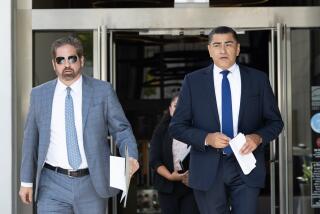Impersonating an Officer Could Be Costly in Los Angeles
In a break with tradition, City Atty. Rocky Delgadillo has asked the networks that will air two new L.A.-based police TV shows to pay licensing fees or risk legal action, saying the city in the past has “basically been lazy about its intellectual property” rights under trademark law.
Representatives from CBS and NBC say that although the fictional characters in the new prime-time shows are clearly Los Angeles Police Department officers, they will not flash the real badge or logo and therefore don’t have to pay to license the rights to those symbols. Both networks have already sold commercial airtime to advertisers for the shows, so a legal glitch with either series could have serious financial implications. Representatives of the attorney’s office have declined to say what kind of action it might take or what it is asking for.
And while the networks rely on municipal cooperation for shooting permits, neither wants to be obligated to answer to the department for their depictions of officers. “We really want to be able to shoot in L.A., but this makes it difficult,” said Mark Graboff, executive vice president of West Coast for NBC, which will air “Boomtown” in the fall, “and this kind of behavior will drive shows out of L.A.”
The LAPD finds itself a long way from old series like “Adam 12” and “Dragnet,” which were virtual public relations machines for the department.
Delgadillo characterized the discussions with NBC as having an “adversarial manner,” when compared with those with producers for CBS’ new drama “Robbery, Homicide Division,” which was created by director Michael Mann. “Boomtown” is produced by NBC Studios and DreamWorks.
Delgadillo’s request comes amid renewed sensitivity at the LAPD to its national reputation in the wake of the Rampart Division’s corruption scandal. Although it did not involve the LAPD, last month’s beating of a handcuffed teenager by an Inglewood police officer stirred memories of the beating of Rodney G. King by LAPD officers whose initial acquittal in that case sparked the 1992 riots. FX’s “The Shield” was originally called “Rampart,” but the producers changed the title at the LAPD’s request.
“We are trying to find that reasonable place between creativity and representation of the LAPD in such a way that it does not damage our image and reputation,” said Los Angeles Police Cmdr. Gary Brennan.
Police dramas in New York, like ABC’s “NYPD Blue,” have not had to deal with City Hall about licensing or trademarks, according to Bill Clark, a former New York detective for 25 years who is a writer and a technical advisor on the long-running drama.
“The only thing they’ve asked us is that we don’t designate a real precinct number as our number,” Clark said “We use 15, and there is no 15th Precinct.”
The LAPD applied in 1999 for the trademark of the badge and logo, according to the LAPD, at about the same time its private but quasi-official sister organization that operates some facilities at the Police Academy, the Los Angeles Police Revolver and Athletic Club, applied for a trademark in connection with the sales of athletic wear and uniforms that denote LAPD.
More to Read
The complete guide to home viewing
Get Screen Gab for everything about the TV shows and streaming movies everyone’s talking about.
You may occasionally receive promotional content from the Los Angeles Times.







